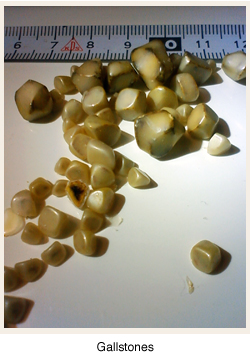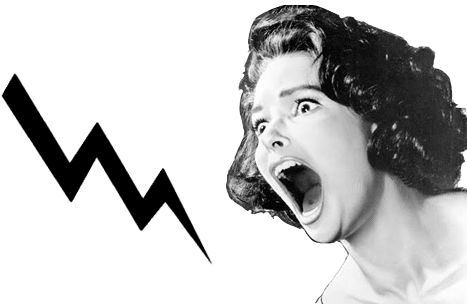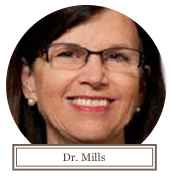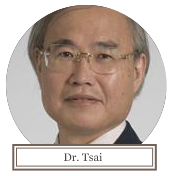 In 2001, FOF Teresa Gordon, 53, experienced “excruciating” stomach pains one day while at work. “It’s was like a knife cutting me from my stomach to my back,” says the Utah resident. She began having sudden attacks like these almost weekly, and for six months doctors couldn’t figure out what was causing the pain. An MRI finally determined the source of her agony–“sand-like” particles in her gallbladder.
In 2001, FOF Teresa Gordon, 53, experienced “excruciating” stomach pains one day while at work. “It’s was like a knife cutting me from my stomach to my back,” says the Utah resident. She began having sudden attacks like these almost weekly, and for six months doctors couldn’t figure out what was causing the pain. An MRI finally determined the source of her agony–“sand-like” particles in her gallbladder.
Gallstones occur in nearly 25% of American women by age 60, and as many as 50% by age 75, according to a research report published by the University of Maryland Medical Center. The good news: You can prevent gallstones from ever becoming a painful attack, like Teresa’s did. The bad news: If you ignore the signs, it can lead to a serious infection or in rare cases, be deadly.
Here, two Harvard-trained gall-bladder experts, Dr. Dixie Mills and Dr. Chung-Jyi Tsai, explain why FOFs are especially at risk for this painful problem and what we can do to prevent it.
Dr. Dixie Mills describes the gallbladder as “a cute little sack, like a cloth jewelery bag, that collects extra bile from our liver.” Sounds important… is it? “It’s more essential than the appendix, but it’s not critical–you can live without it,” she explains.
 Gallstones occur when bits of hardened bile accumulate in the gallbladder “over years,” according to Dr. Mills. Dr. Tsai approximates that 80% of people with gallstones don’t even know they have them. The stones becomes a problem only when they begin to irritate and inflame the gallbladder tissue–as with Teresa’s gallstones. In other cases, “gallstones get so big, they can block the entrance or exit to the gallbladder, which also causes a painful attack,” says Dr. Mills.
Gallstones occur when bits of hardened bile accumulate in the gallbladder “over years,” according to Dr. Mills. Dr. Tsai approximates that 80% of people with gallstones don’t even know they have them. The stones becomes a problem only when they begin to irritate and inflame the gallbladder tissue–as with Teresa’s gallstones. In other cases, “gallstones get so big, they can block the entrance or exit to the gallbladder, which also causes a painful attack,” says Dr. Mills.
Gallbladder Disease in FOFs
“I have several friends who’ve had gallbladder problems, including my best friend who is 5 years younger than I am,” says Teresa.
Teresa’s observation reflects a larger trend: Studies have shown that peri-menopausal and menopausal women are at greater risk for gallbladder stones and attacks than the general population. “Women have more estrogen then men, which is why they are more prone to gallbladder disease,” says Dr. Mills. “In the simplest terms, estrogen is broken down or metabolized in the liver, which makes the liver work harder. This, in turn, produces more bile and puts stress on the gallbladder. During peri-menopause, estrogen levels are a bit higher than normal which is why we may see an increased risk for gallbladder attacks to women in this group.”
As for women who have undergone menopause, “body-weight change is the most common risk factor for gall bladder problems,” says to Dr. Tsai, and as we already know weight gain is very common during and post-menopause.
The major risk factors for gall bladder are summarized by Dr. Mills as “the 5 F’s:”
- Female, Forty. (addressed above)
- Fair. “It seems to be related to people of Scandinavian background which may be genetic or may be based on their diet, we don’t really know,” says Dr. Mills.
- Fertile. “Because estrogen is elevated during pregnancy, some women get gallbladder attacks or gallstones during this time,” says Dr. Mills.
- Fat. “Being overweight can increase the risk of gallbladder problems,” says Dr. Mills. “Fat tissue contains estrogen or cholesterol, which influence how the liver metabolizes lipids.” One study published by Dr. Tsai, found that women with a larger abdominal circumference had a higher risk of gallbladder problems that required surgery.
Diet also plays a role. “Consumption of higher glycemic index food carries a high risk of gallbladder problems including a gallbladder attack,” says Dr. Tsai. (Read: List of 100 foods and their glycemic indexes.) A diet which consists of too much saturated fat may also lead to gallbladder trouble. “Saturated fats are more difficult to break down,” says Dr. Mills. Weight fluctuation or “yo-yo dieting” can also increase your risk.
Symptoms of a gallbladder attack
“An attack can bring a wide spectrum of symptoms, from vague nausea to sharp, debilitating pain.” says Dr. Mills. “Some people have even likened the pain to appendicitis or an ulcer. It can be hard to differentiate, but the pain from a gallbladder attack is usually on the right side and may radiate to the back. It can often come on after a fatty meal.”
“It seems like food had a lot to do with my attacks,” says FOF Teresa. “Spicy food, citrusy food, greasy food, and milk products tended to bring them [attacks] on. We went to dinner one night and I had a steak and a margarita. I woke up in the middle of the night in excruciating pain.”
To operate or not?
After multiple attacks, Teresa had laparoscopic surgery to remove her gallbladder, a minimally-invasive procedure requiring only small keyhole incisions. “90 percent of gallbladder surgeries are now done this way,” says Dr. Mills. Teresa was able to go home the same of she was operated on and says it was neither invasive nor painful.
But surgery is not always necessary. “It depends on how many attacks you have and how severe they are,” says Dr Mills. “A patient with gallbladder attacks may not need surgery, especially if she is willing to implement some lifestyle changes including changing their diet, increasing their exercise, losing weight and maintaining their weight.”
Prevention
Dr. Tsai recommends focusing on “low-cost,” “low-risk” methods, including “eating healthy and maintaining a healthy weight.” One of Dr. Tsai’s studies indicated that “higher consumption of polyunsaturated and monounsaturated fatty acids could prevent the occurrence of gallbladder disease.” Monounsaturated fatty acids include olive oil, peanut oil, avocados and nuts. Polyunsaturated fatty acids are mainly found in vegetable oils (safflower, corn, canola) and fatty fish such as salmon and tuna. Dr. Mills says detox cleanses done under the guidance of a healthcare provider could “help your digestive system a lot and cool down the gall bladder.”
Since Teresa’s surgery, she has implemented her own dietary changes. “I’m Hispanic, so we eat a lot of Mexican food…it was a big change to eat food that was less spicy and not as fried. I’m more conscious about what I eat now.”
—
Dixie Mills, MD, FACS is a Harvard-trained general surgeon and women’s health expert. She is currently a surgeon with the Harvard Vanguard Medical Associates. She is a former practitioner at the Women to Women Healthcare Clinic and a co-founder of Women to Women’s Personal Program. She formerly served as Medical Director at the Dr. Susan Love Research Foundation in California.
—
Dr. Chung-Jyi Tsai, M.D., Ph.D. is a gastroenterologist with the Cleveland Clinic. Dr. Tsai has a doctorate from Harvard Medical School where he and his colleagues have done extensive research on gallstones and gallbladder disease. These studies have been published in the American Journal of Epidemiology, the American Journal of Gastroenterology and other leading medical publications.





0 Responses to “{Health} You may be at risk for a gallbladder attack, and not even know it.”
ctgal says:
During our New Years Eve dinner, my close friend left the table with horrific pains and nausea. We all thought she had a stomach virus and we were all going to get it with all the kissing and hugging and sharing appetizers. Turns out, a smallish gallstone that took 5 days to travel downward. Not a fun experience at all, and there went our New Years Eve! She was miserable, and I learned all about them. Poor thing!
Julia says:
O, I wish I had found you earlier!! I lovoooooe me some chocolate. I found you through the Monday Morning hop! Following, and I hope you’ll stop by to see me!
Cindy Henderson says:
I was diagnosed with Gall Stones when I was pregnant with my second child. I ended up in the hospital with an attack when I was 6 months. It was suggested I have it removed after the baby was born but I was also told it was one big gallstone and wasn’t going to move anywhere. My child is 26 years old and I still have my gallbladder. I have all the risk factors, fair, overweight, and at that time fertile. I do have and occasional attack but after a day or two of fruits and veggies, I’m fine.
cmpease says:
I mostly agree with this article, however, my daughter (29) had a twisted bile duct that caused her attacks which they only found because she opted for surgery. I’s hate to think of the consequences if she did not have the surgery.